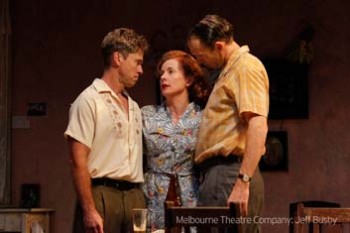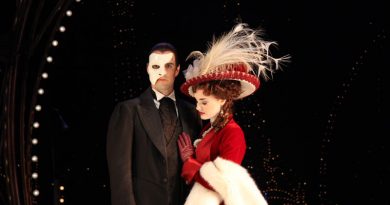Summer of the Seventeenth Doll – Melbourne Season

Sometime in the 70s, the ABC filmed the MTC production of Summer of the Seventeenth Doll; my grandmother made me watch it with her. I didn’t really get it, but I liked it, especially as 1950s Melbourne and 1970s Adelaide weren’t that far apart. Years later in high school, The Doll was an English text and I aspired to be Bubba; I still didn’t really get. Now that I’m older than Pearl and Olive, I get it, and the opening night ovation for this production and for writer Ray Lawler confirmed that it’s still one of the best plays out there and a piece of Australian theatre history that should be compulsory.
Does Summer of the Seventeenth Doll really need an introduction? If you’ve been to high school in Australia, you must have read it. It’s the one set in Carlton in the 50s, where two cane-cutters arrive to spend their 17th five-month lay off with their Melbourne barmaid girlfriends, but one of the women left to get married, the cane season brought trouble and all are confronted with not being 30 anymore.
It’s a brilliant story that forces painful change as each character faces the chasm between what they want to be seen as and who they are, and it’s a masterclass in the power of a three-act structure.
Director Neil Armfield lets Lawler’s writing lead and he guides his cast to find a depth and a rawness to their characters that brings a freshness and new understanding to those familiar with the text.
Steve Le Marquand (Roo), Travis McMahon (Barney) and TJ Power (Johnny) each reject comfort for the need to be masculine, but this production is about the women.
Eloise Winestock shows how much Bubba wants to be a better version of Olive. While Alison Whyte lets Olive be the young woman who flouted convention and ages in moments as she’s offered a salvation that means she’s lost everything.
Robyn Nevin is unforgettable as Olive’s caustic mother Emma, who sees the truth and can’t help her daughter. But Helen Thomson’s Pearl is the performance to see. Too often Pearl is a prude, but Thomson lets us see why Olive chose her in the first place – she’s a hoot – still she knows that reputation is all that she has and can’t let herself be swept into Olive’s life. Choosing an un-married and openly sexual life in the 40s and 50s was a choice that few women willingly made and Olive’s explanation to Pearl about decency depending on people can’t dull the sting of having other women feel sorry for you.
This Summer of the Seventeenth Doll confirmed it as one of my favourite plays. Lawler ensures that we understand why every choice is made, but we long for every one to choose differently and find a way back to happiness and love. Its honesty is as true now as ever and its world is still so close to ours. I’m sure I’m not alone in admitting that I’d bluff happiness rather than have anyone feel sorry for me.
If you love Australian theatre, if you love theatre, you have no excuse to miss this Doll.
More of Anne-Marie’s writing is at sometimesmelbourne.blogspot.com



